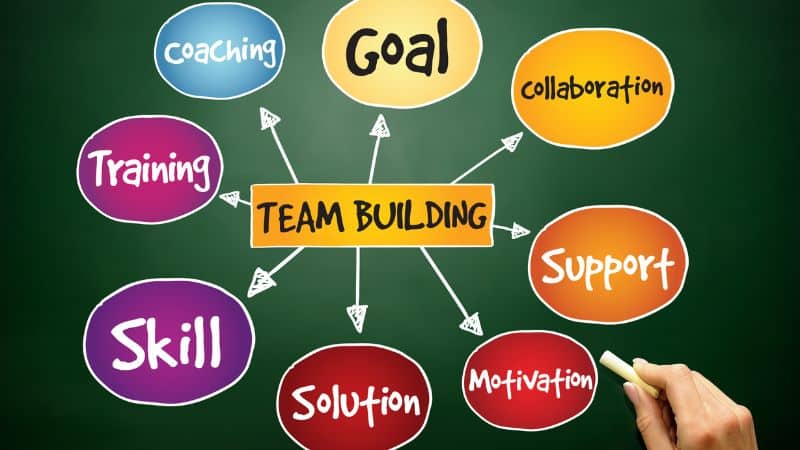Team commitment is important to the success of your organization. You need to get the commitment of the team leader, the members, and other stakeholders.
Team building is the process of creating, inspiring, and enabling team members with complementary personalities, roles, and skills to achieve common objectives. Team building helps align goals, strengthen competencies, encourage commitment, and promote harmonious relationships. I run virtual and in-person team-building workshops to help managers build successful teams.
Many teams fail because members are not committed to their tasks and to each other. Here are practical ways to get encourage team commitment.
What is team commitment?
Team commitment refers to the level of dedication members of the team have for the achievement of goals. A team commitment happens when members are clear about the objectives, the role each member plays, and the tasks that must be done.
The best teams show commitment to each other, commitment to the mission, commitment to the customer, commitment to resolving conflict, and commitment to driving results. Team building activities can help you drive these team commitments.
How to Build Team Commitments
Building a team starts with commitment. Allow me to share with you some tips on how you can use team-building activities to promote team commitments.
1. Begin With An Agreement
When you decide to hold your workshop, begin with a contract or agreement with a trainer. If you are using your in-house trainers, you must get their commitment to helping you conduct your workshop.
The facilitator must fully understand what kind or level of commitment you want to see as a result of team building.
Team building programs can produce many insights, which all lead to the most common answer: teamwork.
Consider the specific behaviors that show team commitment. Ask facilitators if these behaviors can be encouraged during and after your team-building event.
Experts are often tempted to talk about their favorite team principles. That’s okay. But be clear about what you want to change, and the behaviors that demonstrate the change you want.
2. Get the Support of Your Boss
If you want something great to happen, sell your team-building programs to your boss. Be clear about the competencies and behaviors you want to change.
If you can print these behaviors into bumper stickers, that means you are getting into something easy to understand.
Get the commitment of your boss to support your team-building initiatives. Show him the benefits of having your exercises.
Show how team commitment may increase revenue, reduce costs, help build relationships, and prepare your team for the future.
When your boss is committed, he can sponsor your initiatives. Make your boss your best ally.
If you want the team to push team commitment, sell the idea of recognizing team achievements, not just individual achievements, inside the organization.
3. Hire Experts
If you are hiring a team-building facilitator, hire someone who do understand team commitment. It is best if this has designed programs that promote team commitments too.
Many team-building initiatives fail because facilitators are clueless about objectives, and managers do not know that team-building activities can be hyper-customized.
The most engaging and relevant activities can help your team learn and win.
In the Philippines, many managers have the habit of “canvassing” for team-building packages instead of qualifying expert facilitators.
This may sound self-serving because I am a team-building facilitator. But if you have a toothache, will you go to someone who has only Googled ways to cure your toothache?
Do not begin building a team by buying modules or packages because team building is not a product, but a process that will help you equip your team to perform effectively.
Think of team building as an intervention or a solution.
Canned team-building programs are for everyone, and what is for everyone is for no one.
Your team-building expert should be able to help you design and develop activities that build team commitments.
Get your facilitator’s commitment to helping you through the process. Facilitators who are too busy to explain what you need to know aren’t facilitators.
Remember this: a team-building workshop must be tailor-fit to your business.
Remember this also: your contract with your team building facilitator must be from discovery to delivery. You must not shortchange yourself. You do not save money through shortcuts.
4. Co-Design the Program
It is tempting to leave everything to the facilitators. They are the experts anyway. This won’t help you or the facilitator. As a team leader, keep in mind that you are the person building your team. The facilitator is there to help.
This is your team.
Once you and the facilitators have inked your contract, you and the facilitators need to work with other key stakeholders to get their support. I do not require this, but other stakeholders need to know that a team-building workshop will be conducted.
For example, I usually interview senior managers and the CEO. They will provide useful input about what your team needs to accomplish in your team-building workshop.
This will give me a view from the top.
Also, other stakeholders may provide me information about challenges of which you, the team leader, are not aware.
The success of team-building initiatives is dependent on the commitment of team leaders.
5. Get the Commitment of Members
You must onboard your team to your team-building activities. They need to know why you are doing what you are doing. Know their expectations. Tell them yours.
More importantly, you have to get the commitment of your team members. You can start by asking them to answer for you some questions:
a. What is the purpose of our team?
b. What support do you need from our team?
c. What support our team can expect from you?
d. What do you like most about our team when it comes to performance?
e. What do you like most about our team when it comes to relationships?
f. What change do you want to see in our team?
Avoid the wrong road.
This is a common mistake.
In my years of helping organizations build teams, many managers think that team building is a great opportunity to chill and relax.
Others consider team building as an opportunity to exorcise the inner demons of some team members.
They pray that through inspirational speeches, team members will change hearts and be more committed to meeting the business objectives of the organization.
It is common that people go to a team-building workshop clueless about the objectives of the event and hoping that their team-building will not be as boring as last year’s.
Nine of ten people contacted me because they were only looking for descriptions in team-building workshops.
I will be saving time and earning more money by simply delivering the same programs again and again.
But that is not right.
That is not the best way to help customers.
Customers have ideas about their problems, but sometimes they do not know how team-building workshops can really help them. They need to know that process so they can maximize resources, time, and energy.
Team building begins with a commitment from everyone.
Getting the commitment of everyone: the management, your trainers, your members, the customers, and other stakeholders will put you on the right track. Team building is a contact sport.
Ensure the success of your efforts by bringing everyone to your side.
One more thing.
You can design team-building activities to develop five team commitments. Allow me to explain briefly.
Five Team Commitments
There are five team commitments that team leaders need to develop to ensure team success. Team building activities may encourage your members to be aware of these commitments.
Commitment to Team Members
Commitment to Team Members refers to the level of confidence, respect, and trust team members have for each other.
Helping your members to know each other beyond name and job functions will certainly help. You want your members to be committed players.
Commitment to the Mission
People commit when they know the purpose of the team or the organization. You cannot commit to something you don’t know.
Using team building activities, you can help the team understand the importance each one plays in accomplishing the mission.
Encourage ownership and accountability. Make the mission real to them.
Commitment to the Customer
The customer is the lifeblood of any business. We build teams because we want to serve our customers the best way we can.
Team building activities that help employees find ways to serve customers are 10x better than the standard customer service training. That’s because you are helping your team to become problem solvers.
They can create wow when they are together.
Commitment to Resolving Conflict
When your team member is committed to high performance, they are more likely to have conflict. There will be conflicts of interest and differences in ways of solving problems.
Conflict is good when members are committed to resolving conflict and turning conflict into opportunities for collaboration.
Commitment to Drive Results
The team must accomplish its reason for being. When members are committed to driving results, they execute with discipline. They consistently and regularly do what’s best for the organization.
They measure their results because they want to ensure that they are moving forward.
You can help your team build commitment through team-building activities.
What will be your next step?
Team Building Articles
If you’re building a business and you are playing to win…
Let’s install one shift that moves metrics.
→ Shift Experiences








